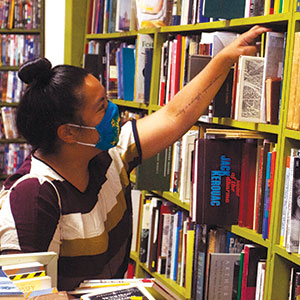

Janice Lobo Sapigao didn’t expect her first year as the Santa Clara County Poet Laureate would be sucker punched by a global pandemic, but she’s determined not to let that stop her from getting South Bay kids to love their own words.
The Silicon Valley native took over the two-year poet laureate position in January. The honorary post comes with a mandate to increase poetry awareness and celebration. Sapigao, a Filipina American poet, author, writer, educator and active community member, has plenty of ideas for that.
She’ll develop paid workshops that can outlive her poet laureate tenure, invest in local college students in need of a boost and create an intensive creative writing and poet laureate program for young people.
“I hear too oftenso much that now I know it’s a factthat students are told that they’re not good writers and … their stories aren’t worth sharing,” Sapigao said. Sometimes kids say a teacher discouraged them, which Sapigao calls “a devastation. But the most heartbreaking answer, she said, is when a student says they just know they aren’t a writer. Sapigao says that is never the case.
“That makes me want to start this program because I think, too many, in too many ways, our youth are told that their voices don’t matter,” she added.
Before the coronavirus, Sapigao regularly hosted and attended open mics from the Bay Area to L.A. and beyond. Now, the South Bay native spends most of her time coaching young writers, and working on her own art. Sapigao also earned a $50,000 grant award from the Academy of American Poets to help create a program.
“Janice is on it,” said Mighty Mike McGee, who yielded his post as Poet Laureate to Sapigao this year. “Initially I felt bad because the pandemic hit during her term, but she’s handling it very well. She’s getting a lot done for youth, and especially marginalized youth the most overlooked voices.”
Already, Sapigao established a memorial fund in honor of her late mother to award $750 to two college students with GPAs in the 2.0-range. She’ll use $15,000 of the funds to run a virtual youth poet laureate program and workshop series, hopefully using paid local poets and with stipends for students.
Sapigao will ask the county to match her $15,000 to extend the program. “I want to make sure that they continue the program and what I am finding is that all of that is up to me,” she said.
The workshops would help local budding poets learn their craft closer to home than she did, though her years at the University of California San Diego offered her a pivotal peek into a part of the state that felt worlds away from her Northern California roots.
Being so near to the U.S.-Mexico border, where she met residents and learned about interest groups that were more heavily politicized, militarized and abundantly conservative than she’d experienced before. Sapigao learned to shape her culture shock into words before she moved home to San Jose with her new ethnic studies degree in 2010. She later earned a Masters of Fine Arts in Writing from the California Institute of the Arts in Valencia.
Today, the countyand countryis grappling with historic and emotional conversations about racism and police brutality. The poet laureate plays an important role in times like this, and Sapigao’s work can be a beacon for other writers, McGee said.
Sapigao was already a beacon once for Cindy Huynh.
As Huynh tells it, she would have dropped out of her PhD program at University of Utah if not for Sapigao’s words and artistry. At just the right time, she stumbled upon Sapigao performing a poem in Oakland. Sapigao’s poetry made it into Huynh’s final dissertation.
“She was definitely among the people I felt like that pulled me through, even though she didn’t know,” Huynh, a San Jose City College professor, said.
Sapigao wants to gas up more people like that.
“People are angry … and I think that we have to make space for that and I think writing and poetry become some of the space to hold it,” Sapigao said. “I think that this is going to be a time of great art, but that great art is going to come from great sacrifice, and already decades, if not centuries, of suffering that we have carried with us.”


